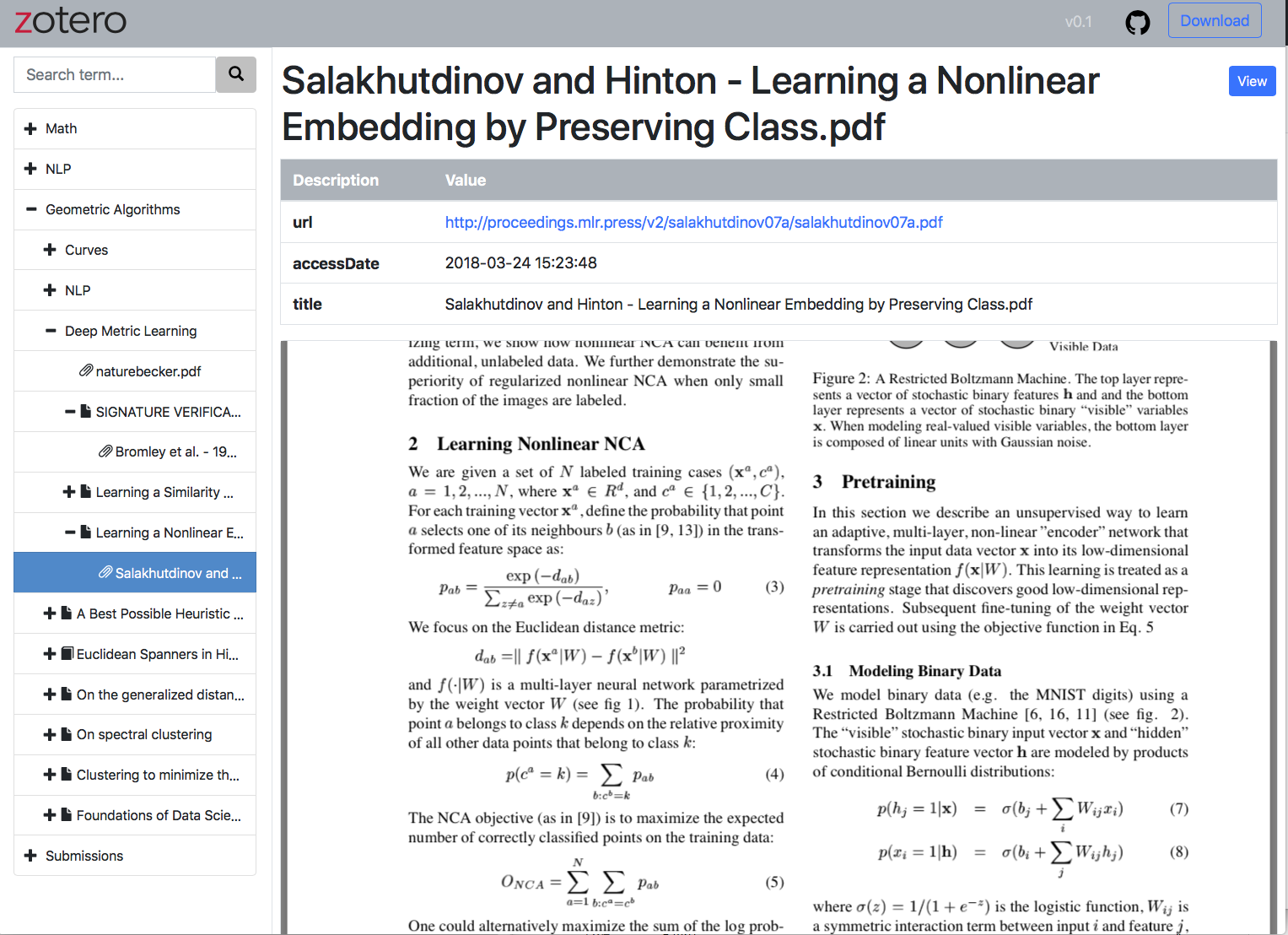This project exports your local Zotero library to a usable HTML website. This generated website has the following features:
- Easily access your papers, site snapshots, notes from a navigation tree.
- Provides metadata from collections and attachments (i.e. referenes etc).
- Display PDF papers and website snapshot (the latter as framed).
- Search function dynamically narrows down the papers you're looking for.
- Embed links to a specific collection, article, item, note etc.
- Export only a portion of your collection with regular expressions using the collection name.
- BetterBibtex integration.
- Snazzy look and feel from the latest Bootstrap CSS/Javascript library.
See the full documentation.
The easist way to install the command line program is via the pip installer:
pip3 install zensols.zotsiteBinaries are also available on pypi.
The tool does the following:
- Exports the meta data (directory structure, references, notes, etc) from your Zotero library. On MacOS, this is done by querying the file system SQLite DB files.
- Copies a static site that enables traversal of the exported data.
- Copies your Zotero stored papers, snapshot (sites) etc.
- Generates a navigation tree to easily find your papers/content.
See the live demo, which provides a variety of resources found in my own library. Note: To my knowledge, all of these resources are free to distribute and violate no laws. If I've missed one, please create an issue.
BetterBibtex plugin for Zotero.
The command line program has two modes: show configuration (a good first step) and to create the web site. You can see what the program is parsing from your Zotero library:
zotsite printTo create the stand-alone site, run the program (without the angle brackets):
zotsite exportIf your library is not in the default $HOME/zotero directory you will need to change that path by making a zotsite.conf config file:
zotsite export -c zotsite.confThis will create the html files in the directory ./zotsite
See usage for more information.
Either an environment variable ZOTSITERC must be set or a -c configuration
option must be given and point to a file to customize how the program works.
See the test configuration file for an example and inline comments for more
detail on how and what can be configured.
Please read this issue if you are installing a Ubuntu or any Linux system with Python 3.5 or previous version.
Command line usage as provided with the --help option:
Usage: zotsite <list|export|print|tmp> [options]
Options:
--version show program's version number and exit
-h, --help show this help message and exit
-w NUMBER, --whine=NUMBER
add verbosity to logging
-c FILE, --config=FILE
configuration file
Actions:
export Export
-o, --outputdir <string> ./zotsite the directory to output the website
--collection <string> regular expression pattern to match collections
print Print structure
--collection <string> regular expression pattern to match collectionsThis software uses:
- Python 3
- Bootstrap version 4
- Tree View for Bootstrap
- Popper for tooltips
- Copy to Clipboard function
Also see the live demo.
- Make the site portion a proper Javascript site. Right now, all the
mins are added in the distribution to same directory as the main navigation/content file. - Add functionality to the disabled View button that drills down in a paper and finds a PDF or site to view withouth the user having to do this.
- Use something like zotxt to make this work with a plugin rather than directly against the SQLite DB.
This is listed as a plugin on the Zotero site.
An extensive changelog is available here.
Copyright (c) 2020 - 2021 Paul Landes

